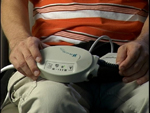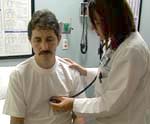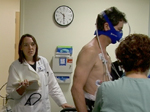|
by Cindy Abole
Public Relations
Hampton native Thomas Joyner suffered from heart failure for years, but
last fall his health deteriorated dramatically. Ashen and weak, Joyner,
a father of three and former paramedic and volunteer firefighter,
struggled with advanced stages of congestive heart failure.
After being admitted to a Charleston area hospital several times for
recurrent symptoms Joyner was referred to Jennifer Peura, M.D., and the
heart transplant team at the MUSC Heart & Vascular Center. As he
required intravenous medication to help his heart function properly he
was quickly placed as a Status 1B on the United Network for Organ
Sharing (UNOS) heart transplant list.
Unfortunately, he took a turn for the worse while waiting at home for
news of a donor heart. He was re-admitted to the hospital with
dramatically low blood pressure, kidney and liver failure. He was
placed on life support and upgraded to Status 1A,, the top priority
status for receiving a donor heart.
 MUSC
patient Thomas Joyner shows off his new HeartMate LVAD device, a new
bridge-to-transplant device that helps pump the heart. The device is
the size of a portable CD player and fits within a pouch that he
carries everywhere. MUSC
patient Thomas Joyner shows off his new HeartMate LVAD device, a new
bridge-to-transplant device that helps pump the heart. The device is
the size of a portable CD player and fits within a pouch that he
carries everywhere.
Running out of time, Peura evaluated her patient for a new mechanical
heart assist device, the Thoratec HeartMate II left ventricular assist
device (LVAD). Joyner became the first South Carolina patient to
receive this new heart pump device. The HeartMate II can serve as a
bridge-to-transplant for patients who are awaiting a heart transplant.
Joyner’s implant surgery was conducted by Matthew Toole, M.D.,
cardiothoracic surgeon, on April 7.
 Thomas Joyner completes a check up with MUSC's Dr. Jennifer Peura. Thomas Joyner completes a check up with MUSC's Dr. Jennifer Peura.
According to Toole, the FDA-approved device restores a person’s blood
flow by taking over the heart’s pumping action. A small, fast-spinning
turbine rotor pump allows the blood to circulate continuously, thus
giving the patient an almost non-detectible pulse. The device prevents
the consequences of heart failure such as fatigue, swelling and
multiple organ failure. An electronic controller and batteries, which
are worn in a holster outside the patient’s body, power the rotor
pump.
“Without the HeartMate II, Joyner would have died before receiving a
heart transplant or been committed to the hospital for support with an
older LVAD that has significant restrictions,” said Peura, who
conducted her internal medicine residency at MUSC and served as medical
chief resident. “This new HeartMate device allows him to be mobile and
enjoy a remarkable quality of life while awaiting transplant.”
Since the 1980s, MUSC’s Heart Transplant program has cared for hundreds
of heart transplant patients from across the Palmetto state. Today,
MUSC’s program boasts survival rates among the best in the nation
thanks to their multidisciplinary team that includes nurses, nurse
practitioners, physical therapists, nutritionists, financial counselors
and others. This team is anxious to expand their practice to
HeartMateII as it will provide the opportunity to save even more lives.
During her Advanced Heart Failure fellowship at Washington University
in St. Louis, Peura participated in clinical trials for the
HeartMateII. “In the near future we anticipate use of this device to
improve the quality of life for all patients with advanced heart
failure, even those not candidates for transplant,” said Peura. In
July, Michael Craig, MD will join the team following completion of an
Advanced Heart Failure Fellowship at The Ohio State University, one of
the busiest LVAD programs in the nation. This team is ready and excited
to welcome patient referrals for HeartMateII.
 Dr. Jennifer Peura monitors patient Thomas Joyner in preparation for his July 10 heart transplant. Dr. Jennifer Peura monitors patient Thomas Joyner in preparation for his July 10 heart transplant.
According to Peura, an estimated 30 percent patients listed for
transplant die before a heart becomes available. Many more are too sick
even to be listed. With the Heartmate II and other heart assist
devices, patients have improved physical condition while waiting for
transplant and others may become transplant candidates as their
condition improves. “Our worry is that statewide options for patients
with advanced heart failure may seem limited, however with heart
transplant and the HeartMate II we are able to offer more hope than
ever before,” said Peura.
Meanwhile, Joyner is pleased to have made it to his 48th birthday on
June 7. He participated in daily medically-supervised exercise sessions
at MUSC’s Cardiac Rehab facility at the corner of Bee and Courtenay
streets, and is now enjoying an active lifestyle at home while awaiting
his heart transplant. He’s anxious for the day that he will return to
work as an electrician and plumber; resume family activities; and enjoy
other things like fishing.
“I hope to get to see and enjoy a lot more birthdays in my lifetime,”
he said, with a smile. “I didn’t think I’d make it to this one. I’m
grateful to MUSC’s nurses, physicians and staff for giving me the best
of care.”
Friday, July 10, 2009
|





